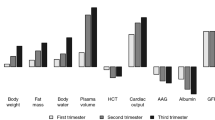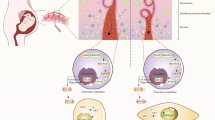Abstract
Preeclampsia and HIV are a significant burden to maternal health globally, especially in low-middle income countries such as South Africa. In the KwaZulu-Natal province, SA antenatal HIV prevalence is 41.1%, while PE is 12%. PE and HIV infections are maternal stress and inflammation that impact placental function and fetal development. Therefore, this study investigated the impact of the comorbidity of PE and HIV on placental stress and neurodevelopment. Placentae were obtained from four cohorts of pregnant women: normotensive HIV negative, normotensive HIV positive, preeclamptic HIV negative, and preeclamptic HIV positive. The placental tissue sections were immunostained for OGT and T4. Our findings showed that the maternal weight, diastolic, and systolic blood pressures (BP) were higher in PE vs. the normotensive groups, irrespective of HIV status. In addition, significant changes were noticed in the placental weight, fetoplacental ratio, and placental efficiency coefficient. Our findings showed that the maternal weight, diastolic, and systolic blood pressures (BP) were statistically higher in the PE compared to the normotensive. No significant differences were observed between HIV positive and HIV negative groups. In addition, significant changes were noticed in the placental weight, fetoplacental ratio, and placental coefficient. Furthermore, considerable upregulation in the placental expression of OGT in both the conducting and exchange villi of PE and concomitant downregulation in HIV-positive patients compared with Normotensive and HIV-negative individuals, respectively. Our results provide inferential evidence on the dysregulation of OGT in the comorbidity of PE and HIV. This may mediate a compromised programmed outcome of an adverse maternal environment during pregnancy and consequently affect fetal development.








Similar content being viewed by others
Data availability
All data generated or analysed during this study are included in this published article.
References
Adu-Gyamfi EA, Wang YX, Ding YB (2020) The interplay between thyroid hormones and the placenta: a comprehensive review. Biol Reprod 102(1):8–17. https://doi.org/10.1093/biolre/ioz182
Arab K, Spence AR, Czuzoj-Shulman N, Abenhaim HA (2017) Pregnancy outcomes in HIV-positive women: a retrospective cohort study. Arch Gynecol Obstet 295(3):599–606. https://doi.org/10.1007/s00404-016-4271-y
Bergman K, Sarkar P, CONNOR TG, Modi N, Glover V (2007) Maternal stress during pregnancy predicts cognitive ability and fearfulness in infancy. J Am Acad Child Adolesc Psychiatry 46(11):1454–1463. https://doi.org/10.1097/chi.0b013e31814a62f6
Bleker LS, De Rooij SR, Roseboom TJ (2019) Programming effects of prenatal stress on neurodevelopment—the pitfall of introducing a self-fulfilling prophecy. Int J Environ Res Public Health 16(13):2301. https://doi.org/10.3390/ijerph16132301
Collazos J, Ibarra S, Mayo J (2003) Thyroid hormones in HIV-infected patients in the highly active antiretroviral therapy era: evidence of an interrelation between the thyroid axis and the immune system. AIDS 17(5):763–765. https://doi.org/10.1097/00002030-200303280-00019
Croy BA, Wessels J, Linton N, Tayade C (2009) Comparison of immune cell recruitment and function in endometrium during development of epitheliochorial (pig) and hemochorial (mouse and human) placentas. Placenta 30:26–31. https://doi.org/10.1016/j.placenta.2008.09.019
El-Bakry AM, El-Gareib AW, Ahmed RG (2010) Comparative study of the effects of experimentally induced hypothyroidism and hyperthyroidism in some brain regions in albino rats. Int J Dev Neurosci 28(5):371–389. https://doi.org/10.1016/j.ijdevneu.2010.04.003
Elliot MG, Crespi BJ (2006) Placental invasiveness mediates the evolution of hybrid inviability in mammals. Am Nat 168(1):114–120. https://doi.org/10.1086/505162
Etzel JV, Brocavich JM, Torre M (1992) Endocrine complications associated with human immunodeficiency virus infection. Clin Pharm 11(8):705–713
Forhead AJ, Fowden AL (2014) Thyroid hormones in fetal growth and prepartum maturation. J Endocrinol 221(3):R87-103. https://doi.org/10.1530/JOE-14-0025
González R, Rupérez M, Sevene E, Vala A, Maculuve S, Bulo H, Nhacolo A, Mayor A, Aponte JJ, Macete E, Menendez C (2017) Effects of HIV infection on maternal and neonatal health in southern Mozambique: a prospective cohort study after a decade of antiretroviral drugs roll out. PLoS ONE 12(6):e0178134. https://doi.org/10.1371/journal.pone.0178134
Gould E, Woolley CS, McEwen BS (1991) The hippocampal formation: morphological changes induced by thyroid, gonadal and adrenal hormones. Psychoneuroendocrinology 16(1–3):67–84. https://doi.org/10.1016/0306-4530(91)90071-Z
Hernández S, Catalán-García M, Morén C, García-Otero L, López M, Guitart-Mampel M, Milisenda J, Coll O, Cardellach F, Gratacós E, Miró Ò (2017) Placental mitochondrial toxicity, oxidative stress, apoptosis, and adverse perinatal outcomes in HIV pregnancies under antiretroviral treatment containing zidovudine. JAIDS J Acquir Immune Defic Syndr 75(4):e113–e119. https://doi.org/10.1097/QAI.0000000000001334
Howerton CL, Morgan CP, Fischer DB, Bale TL (2013) O-GlcNAc transferase (OGT) as a placental biomarker of maternal stress and reprogramming of CNS gene transcription in development. Proc Natl Acad Sci 110(13):5169–5174. https://doi.org/10.1073/pnas.1300065110
Hubel CA (1999) Oxidative stress in the pathogenesis of preeclampsia. Proc Soc Exp Biol Med 222(3):222–235. https://doi.org/10.1046/j.1525-1373.1999.d01-139.x
Ibrahim M, Adeniran A, Ibrahim MA, Woodward C, Mital D, Ahmed MH (2019) Thyroid function in individuals living with human immunodeficiency virus: the concern and debate about regular screening. Ann Thyroid 4:12. https://doi.org/10.21037/aot.2019.07.01
Jakó M, Surányi A, Kaizer L, Németh G, Bártfai G (2019) Maternal hematological parameters and placental and umbilical cord histopathology in intrauterine growth restriction. Med Princ Pract 28(2):101–108. https://doi.org/10.1159/000497240
Ji S, Jin C, Höxtermann S, Fuchs W, Xie T, Lu X, Wu H, Cheng L, Skaletz-Rorowski A, Brockmeyer NH, Wu N (2016) Prevalence and influencing factors of thyroid dysfunction in HIV-infected patients. Biomed Res Int. https://doi.org/10.1155/2016/3874257
Jinno S, Chang S, Jacobs MR (2012) Coccidioides thyroiditis in an HIV-infected patient. J Clin Microbiol 50(7):2535–2537. https://doi.org/10.1128/JCM.00605-12
Kiertiburanakul S, Sungkanuparph S, Malathum K, Pracharktam R (2003) Concomitant tuberculous and cryptococcal thyroid abscess in a human immunodeficiency virus-infected patient. Scand J Infect Dis 35(1):68–70. https://doi.org/10.1080/0036554021000026991
Le Doare K, Bland R, Newell ML (2012) Neurodevelopment in children born to HIV-infected mothers by infection and treatment status. Pediatrics 130(5):e1326–e1344. https://doi.org/10.1542/peds.2012-0405
Lee BE, Suh PG, Kim JI (2021) O-GlcNAcylation in health and neurodegenerative diseases. Exp Mol Med 53(11):1674–1682. https://doi.org/10.1038/s12276-021-00709-5
Lima VV, Dela Justina V, dos Passos Jr RR, Volpato GT, Souto PC, San Martin S, Giachini FR (2018) O-GlcNAc modification during pregnancy: focus on placental environment. Front Physiol 9:1263. https://doi.org/10.3389/fphys.2018.01263
Lurie S, Feinstein M, Mamet Y (1999) Human fetal-placental weight ratio in normal singleton near-term pregnancies. Gynecol Obstet Invest 48(3):155–157. https://doi.org/10.1159/000010163
Martinez MR, Dias TB, Natov PS, Zachara NE (2017) Stress-induced O-GlcNAcylation: an adaptive process of injured cells. Biochem Soc Trans 45(1):237–249. https://doi.org/10.1042/BST20160153
McHenry MS, McAteer CI, Oyungu E, McDonald BC, Bosma CB, Mpofu PB, Deathe AR, Vreeman RC (2018) Neurodevelopment in young children born to HIV-infected mothers: a meta-analysis. Pediatrics. https://doi.org/10.1542/peds.2017-2888
Moog NK, Entringer S, Heim C, Wadhwa PD, Kathmann N, Buss C (2017) Influence of maternal thyroid hormones during gestation on fetal brain development. Neuroscience 342:68–100. https://doi.org/10.1016/j.neuroscience.2015.09.070
Naidoo G, Khaliq OP, Moodley J, Naicker T (2021) The role of soluble E-selectin in HIV associated preeclampsia. Eur J Obstet Gynecol Reprod Biol 257:64–69
Ndirangu J, Newell ML, Bland RM, Thorne C (2012) Maternal HIV infection associated with small-for-gestational age infants but not preterm births: evidence from rural South Africa. Hum Reprod 27(6):1846–1856. https://doi.org/10.1093/humrep/des090
Opazo MC, Gianini A, Pancetti F, Azkcona G, Alarcón L, Lizana R, Noches V, Gonzalez PA, Porto M, Mora S, Rosenthal D (2008) Maternal hypothyroxinemia impairs spatial learning and synaptic nature and function in the offspring. Endocrinology 149(10):5097–5106. https://doi.org/10.1210/endo.150.1.9997
Pemberton HN, Franklyn JA, Kilby MD (2005) Thyroid hormones and fetal brain development. Minerva Ginecol 57(4):367–378 (PMID: 16170282)
Raijmakers MT, Tits BJ, Hak-Lemmers HL, Roes EM, Steegers EA, Peters WH (2004) Low plasma levels of oxidized low density lipoprotein in preeclampsia. Acta Obstetricia Et Gynecol Scand 83(12):1173–1177. https://doi.org/10.1080/j.0001-6349.2004.00539.x
Santosa WB, Staines-Urias E, Tshivuila-Matala CO, Norris SA, Hemelaar J (2019) Perinatal outcomes associated with maternal HIV and antiretroviral therapy in pregnancies with accurate gestational age in South Africa. AIDS 33(10):1623–1633. https://doi.org/10.1097/QAD.0000000000002222
Sardana D, Nanda S, Kharb S (2009) Thyroid hormones in pregnancy and preeclampsia. J Turk Ger Gynecol Assoc 10(3):168
Sellmeyer DE, Grunfeld CA (1996) Endocrine and metabolic disturbances in human immunodeficiency virus infection and the acquired immune deficiency syndrome. Endocr Rev 17(5):518–532. https://doi.org/10.1210/edrv-17-5-518
Shallie PD, Naicker T (2019) The placenta as a window to the brain: a review on the role of placental markers in prenatal programming of neurodevelopment. Int J Dev Neurosci 73:41–49. https://doi.org/10.1016/j.ijdevneu.2019.01.003
Sherr L, Croome N, Parra Castaneda K, Bradshaw K (2014) A systematic review of psychological functioning of children exposed to HIV: using evidence to plan for tomorrow’s HIV needs. AIDS Behav 18(11):2059–2074. https://doi.org/10.1007/s10461-014-0747-6
Stanzi LE, Donald K, Brittain K, Phillips TK, Zerbe A, Nguyen KK, Strandvik A, Kroon M, Abrams EJ, Landon MY (2018) Neurodevelopment of breastfed HIV-exposed uninfected and HIV-unexposed children in South Africa: a prospective cohort. AIDS (london, England) 32(13):1781. https://doi.org/10.1097/QAD.0000000000001872
Valko M, Leibfritz D, Moncol J, Cronin MT, Mazur M, Telser J (2007) Free radicals and antioxidants in normal physiological functions and human disease. Int J Biochem Cell Biol 39(1):44–84. https://doi.org/10.1016/j.biocel.2006.07.001
Walsh SW (1998) Maternal-placental interactions of oxidative stress and antioxidants in preeclampsia. Semin Reprod Endocrinol 16(1):93–104
Wang Y, Walsh SW (1996) Antioxidant activities and mRNA expression of superoxide dismutase, catalase, and glutathione peroxidase in normal and preeclamptic placentas. J Soc Gynecol Investig 3(4):179–184. https://doi.org/10.1177/107155769600300404
Wisner K (2019) Gestational hypertension and preeclampsia. MCN Am J Matern Child Nurs 44(3):170. https://doi.org/10.1097/NMC.0000000000000523
Xiao PL, Zhou YB, Chen Y, Yang MX, Song XX, Shi Y, Jiang QW (2015) Association between maternal HIV infection and low birth weight and prematurity: a meta-analysis of cohort studies. BMC Pregnancy Childbirth 15(1):1–1. https://doi.org/10.1186/s12884-015-0684-z
Yang Y, Le Ray I, Zhu J, Zhang J, Hua J, Reilly M (2021) Preeclampsia prevalence, risk factors, and pregnancy outcomes in Sweden and China. JAMA Netw Open 4(5):e218401. https://doi.org/10.1001/jamanetworkopen.2021.8401
Yung HW, Alnæs-Katjavivi P, Jones CJ, El-Bacha T, Golic M, Staff AC, Burton GJ (2016) Placental endoplasmic reticulum stress in gestational diabetes: the potential for therapeutic intervention with chemical chaperones and antioxidants. Diabetologia 59(10):2240–2250. https://doi.org/10.1007/s00125-016-4040-2
Zavascki AP, Maia AL, Goldani LZ (2007) Pneumocystis jiroveci thyroiditis: report of 15 cases in the literature. Mycoses 50(6):443–446. https://doi.org/10.1111/j.1439-0507.2007.01395.x
Funding
NRN and PDS are supported by the NICHD grant #R01HD088549 at UMKC and the content is solely the responsibility of the authors and does not necessarily represent the official views of the US National Institutes of Health”. TN and PDS are supported by the International Brain Research Organization-African Regional Committee (IBRO-ARC), 2017 and International Society for Neurochemistry/International Brain Research Organization (ISN/IBRO) Postdoctoral fellowship, 2017.
Author information
Authors and Affiliations
Contributions
PDS, TN and NRN conceived and designed the study. PDS processed the samples. All authors participated in the data analysis and manuscript preparation. All authors read the final version of the manuscript.
Corresponding authors
Ethics declarations
Conflicts of interest
The authors declare no competing financial interests. The Department of Health and the institutional Biomedical Research Ethics Committee (Reference Number: BE 183/17) granted permission for this study. The study was conducted per the Declaration of Helsinki and approved by the Institutional Review Board (or Ethics Committee) of the University of Kwazulu-Natal, South Africa, and the University of Missouri Kansas City.
Additional information
Publisher's Note
Springer Nature remains neutral with regard to jurisdictional claims in published maps and institutional affiliations.
About this article
Cite this article
Shallie, P.D., Naicker, T. & Nayak, N.R. Stress-Sensitive Regulators of Fetal Neurodevelopment in HIV and Preeclampsia: An Immunocytochemical Appraisal of Placental OGT and T4 Levels. Arch. Immunol. Ther. Exp. 71, 3 (2023). https://doi.org/10.1007/s00005-023-00668-x
Received:
Accepted:
Published:
DOI: https://doi.org/10.1007/s00005-023-00668-x




